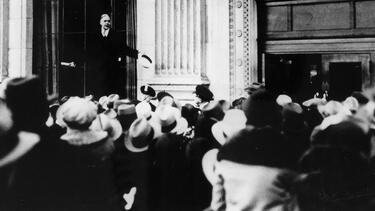Crashes and COVID-19 in Historical Context
The stock markets are reeling as fear and uncertainty about the global pandemic grow. We asked Yale SOM’s William Goetzmann, whose research includes financial history, to put the volatility into historical perspective.

John Poole, president of the Federal American Bank, reassuring a crowd of anxious depositors in February 1931. Photo: Popperfoto via Getty Images.
Do you think the large sell-off in financial markets is being driven by rational expectations, or is some other force at work?
The stock market fluctuation appears to be driven by a number of things, including grave uncertainty about the scale of the global recession and the consequences for corporate profits; the possibility of the breakdown in the financial system and the inability to finance business in the short term, even if the future profit outlook is good; and margin calls on investors that result in liquidations of securities. It is not clear that the current market is behaving irrationally, given that this is nearly an unprecedented global event.
Are there good historical precedents to look at to try to understand the current crisis?
The 1918 influenza epidemic is a natural benchmark. Millions died. The world entered a global recession in 1920. It is difficult to disentangle the effects of the First World War from the effects of the pandemic, however. Thus, we can’t easily use that event as a model.
This year is the 300th anniversary of the earliest and biggest global stock market crash, which started in France with the Mississippi company that owned the Louisiana territory. It spread in a couple of months to Britain, and then finally to Holland. Stocks had risen by a factor of 8 or 10. Speculators had gotten rich, but then the markets failed, and prices dropped back to earth.
During the crash of October 28 and 29, 1929, the market dropped 12%–13% on each day. In the crash of 1987, the market fell by nearly 23%, bouncing back by the end of the year. In the 2008 crash, it fell by more than 20% in a week. The crash of 1973 took longer to materialize.
Notice something: big crashes are really, really rare. There is some psychological research by Eric J. Johnson and Amos Tversky that connects news of a rare disaster with an increased belief that an unrelated rare disaster could happen. Perhaps seeing rare shocks like the news that Tom Hanks and his wife tested positive for the virus triggers a sense that unexpected bad things are more likely.
My research with Dasol Kim on crashes looks at all of the large declines over a 12-month period in the world’s stock markets. There were more than 1,000 crashes over 50% in a year. There were 8,549 annual crashes of the scale we have seen. Once the decline gets bigger, the probability of a bounce-back in the next year increases dramatically.
What do we know about investor behavior after a crash?
Researchers Ulrike Malmendier and Stefan Nagel studied the investment behavior of people who lived through the Great Depression and those who experienced high inflation in their lifetimes. These life experiences made permanent changes, and they are associated with higher expectations of bad times and high inflation. In recent times, household investment in the stock market has declined; it is lower now than in the mid-2000s. This may be due to continued concerns about a market crash. We also know from investor surveys conducted by the International Center for Finance at Yale SOM for professor Robert Shiller that people’s expectations of a market crash are strongly influenced by the news. Negative news has a bigger impact than positive news.
While it sounds like a vaccine is at least a year away, I think news about the development of a cure or a vaccine will reduce the uncertainty about the very long term. The 1918–19 influenza reappeared a couple of times, and even in 1920 people were not clear it was over. If we knew there was a time certain when this would be over—a light at the end of the tunnel—I think it would put a floor on asset prices and expectations.
The 20th century had all sorts of terrible events—pandemics, wars, and disasters—with much bigger effects on populations. The global economies dug themselves out of these much deeper holes. I just hope that our policies can be flexible enough to try out solutions.